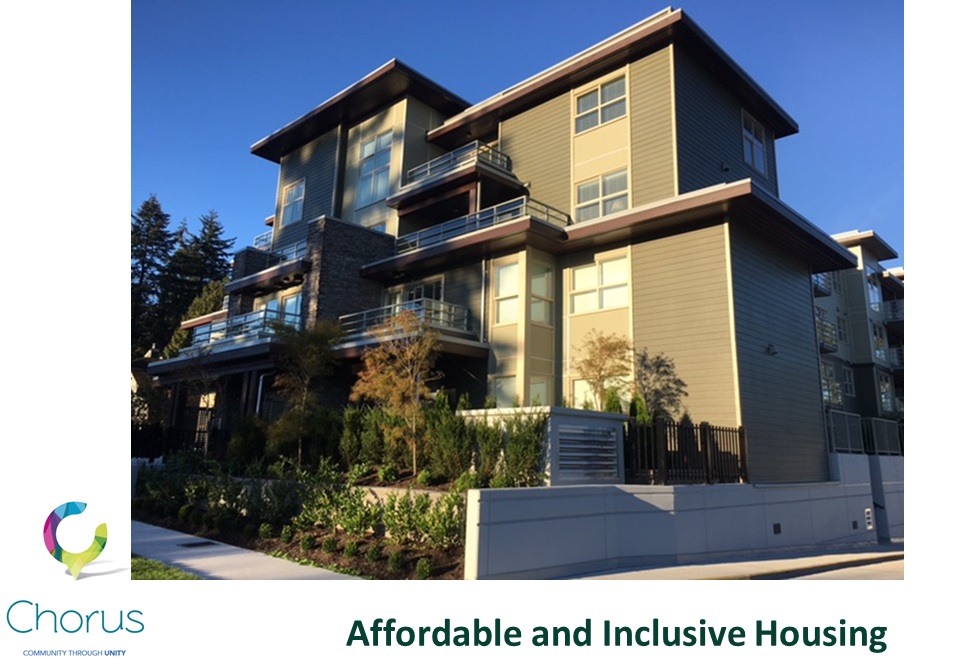Inclusive Rental Housing Works
By Doug Tennant, CEO, UNITI
People who have intellectual disabilities are taking their rightful place as tenants living in apartments like any other member of our community and UNITI, the organization that I represent, is working hard to support this in Metro Vancouver. UNITI is a partnership of three not-for-profit organizations: Semiahmoo House Society (SHS), which supports people who have intellectual disabilities to live full lives in their community; Peninsula Estates Housing Society (PEHS), which develops and runs affordable and inclusive housing; and The Semiahmoo Foundation (TSF), which exists to partner with other charitable organizations to support people who have disabilities. The UNITI partners work together to create housing that is inclusive of people who have intellectual disabilities and affordable for the community in general.
Fifty years ago, there were really only two places for adults with developmental disabilities to live in Canada: with their family or in an institution. In 2014, we know that the best place for people to live is in their community, but, sadly, there are still too few living options for people who have intellectual disabilities. Many adults still live at home with their parents, others share homes with families in their community, but very few have the option to live in a home of their choosing with people they want to live with. As it is now, many families are being pushed into crisis as they support their adult children into their 20s, 30s, and beyond.

When I speak with people who have intellectual disabilities about housing, they overwhelmingly say that they would prefer to live in their community, close to their family and friends, with good transit access for shopping and employment. This was also the case 14 years ago when my predecessor, Paul Wheeler, brought a group of young people and their parents together to find out how they would like to live. The information that was gathered back then was used to develop Chorus, an inclusive and affordable 71 unit apartment in South Surrey that is owned and maintained by Peninsula Estates Housing Society, a partner organization in UNITI. Chorus opened in August of 2016 with 20 rental homes for people who have intellectual disabilities and 51 for the general public at affordable rates. I’d like to share some of the key learnings we’ve had through the development and running of Chorus:
- Affordable rental housing (10 to 20% below market) is not a charitable endeavour and cannot be built or run by a charity. TSF (a charity) had to sell the Chorus property to PEHS (a non-profit) before we began construction, with a property tax bill of over $40,000.
- People who have intellectual disabilities want to live in apartments in their community. At one time we had over 140 people interested in the 20 units for people with intellectual disabilities.
- The general community is comfortable living in an apartment that has tenants who have intellectual disabilities. The 51 units for the general public were rented up with very little advertising on our part.
- People with intellectual disabilities need a portable rental supplement similar to SAFER to have fair access to rental housing. The gap between the $375 shelter allowance and market rent in BC makes it impossible for most people who have intellectual disabilities to live anywhere other than with their family or in a home share situation, even if neither of these is preferred.
- People with intellectual disabilities are good tenants. All of the original tenants who have intellectual disabilities are still living at Chorus and they have been model tenants. Staff from SHS support tenants with tenant issues, and this makes is easier for the landlord (PEHS).
- The tenants with intellectual disabilities have thrived living in their own homes. Nearly two years in and the tenants report that living on their own with support has had a positive effect on their lives in many ways: they are more independent, have greater social capital, and really enjoy their independence.

It’s clear to me that people with intellectual disabilities have a right to live where and with whom they choose. UNITI will continue to support this right. What I’ve really enjoyed about the Chorus project is how the tenants who have had their housing rights addressed have taken on the responsibility of having their own home. Whenever I have visited with them, I have found their homes neat and well-cared for. Now that they have their own home, they are inviting family and friends over to their place for meals and visits: they are sharing their bounty with others.
PEHS’s experience as a landlord for tenants with intellectual disabilities has been a good one because the tenants have been responsible and SHS has provided support for any tenant issues that have arisen. As more people with intellectual disabilities claim their right to live in the community, landlords need to know that being inclusive is a positive for their rental properties.
__
May 27 to June 2, 2018 is National AccessAbility Week. LandlordBC promotes access to safe, stable and inclusive housing.
